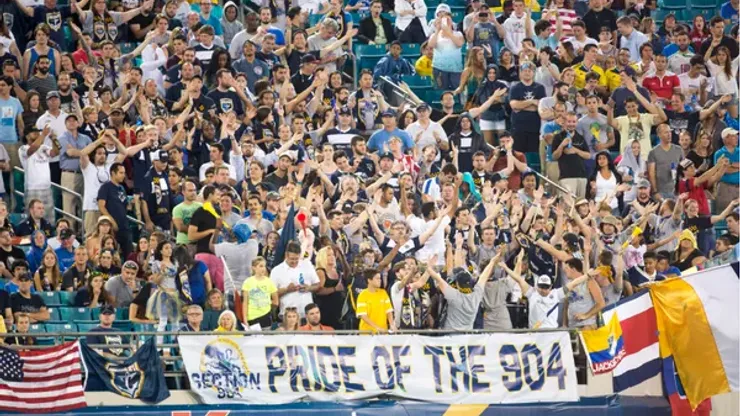The Jacksonville Armada FC completed the club’s inaugural season this past Sunday sporting an announced record crowd of over 9,000 at the Baseball Grounds. This final match of the Armada’s first season culminated what has been an off-the-field model of how to launch an expansion team in NASL. From superior marketing to outstanding market-wide branding, the Armada have been a hit. However, on-the-field the squad has lagged behind in-state NASL rivals Tampa Bay and Fort Lauderdale both of whom entered the final weekend of the season with an opportunity to qualify for the NASL’s unique four club postseason “The Championship.” Fort Lauderdale’s late goal clinched this match 1-0 and a spot in the postseason, leaving Jacksonville bottom of the table in the 11-team NASL.
The difficult on-field struggles for the Armada had a lot to do with a fundamental misunderstanding of the types of players and coaches that succeed in American lower division soccer. Overloading the side with technically gifted foreign players and well-respected international coaches looked good on paper before the season started. However, since only a handful of the signed had been through the wars of leagues like NASL, issues such as the length of travel, physical play, uneven and quick turnaround of matches sunk the Armada’s hopes of making a playing splash in year one. By early September, the club had dismissed its entire soccer hierarchy and began planning for year two in terms of a new playing style and technical staff.
What the team may have gotten wrong in building an on-the-field product, the Armada got it spot on with marketing and promoting the club. Led by local owner Mark Frisch, who is himself a soccer fan, the club has bonded with supporters and courted all elements of the existing soccer infrastructure in the area. The success of several local amateur teams and multiple United States Men’s National Team friendlies built a base of fans that had eroded following the demise of the Jacksonville Cyclones of the A-League in the late 1990’s. Frisch smartly hired soccer people and others with professional sports experience to cultivate this existing supporters’ base and enhanced it by creating strong partnerships with the youth soccer community. Memories of Jacksonville Tea Men of the original NASL have faded among many locals, but those who have continued to be involved in the sport since those heady days of the early 1980’s were instantly courted by the Armada.
The Armada began ramping up operations in the summer of 2013, almost a full two years before kicking a ball in NASL play. All of the early legwork paid off as the team smartly connected with millennials in its marketing – many of these individuals were not previously soccer fans and had little interest in other local sports, but the international appeal of this sport and the marketing efforts of the Armada proved attractive. One of the reasons this worked was the accessibility to players the club provides. The community oriented approach of Frisch and his team president Steve Livingstone allowed the club to build relationships between fans and players that is largely absent in American pro sports today.
This season the Armada, per my sources, sold more sponsorships than any other NASL club. While selling sponsorship is one thing, treating sponsors well and maintaining relationships is sometimes even more difficult. The Armada’s matchday experience at Community First Ballpark is among the best I have experienced in US lower division soccer. The park is properly branded for soccer yet utilizes the superior concessions and concourse space that baseball stadiums provide to create a degree of a carnival atmosphere combined with a nice day out at the park.
SEE MORE: Appetite for pro soccer in Florida proving critics are dead wrong.
Second season syndrome is often a real one in the lower tiers of American soccer. Owners who deal with unexpected financial loses or disappointment on the field scale back operations and regress to the mean in an arena where the fail rate among clubs has been massive over the course of the last 15 years. But the Armada, who averaged more fans per game this season than Orlando City SC ever did in the four years they competed in the lower tiers of American soccer before moving to MLS and averaging over 32,000 fans a game, have no plans to scale back. This is a remarkable statistic especially considering the Jacksonville media market has less than half the people than the Orlando market.
Instead of falling into offseason mode, this week the Armada staff is rolling up their sleeves and working the community like any other week. Successful organizations use the offseason strategically and keep working – and the Armada is in the process of transitioning from model startup to model long-term club in the state of Florida.
Next season, the club hopes to have a more successful on-the-field product while continuing the same effective marketing success of year one.
200+ Channels With Sports & News
- Starting price: $33/mo. for fubo Latino Package
- Watch Premier League, Women’s World Cup, Euro 2024 & Gold Cup
The New Home of MLS
- Price: $14.99/mo. for MLS Season Pass
- Watch every MLS game including playoffs & Leagues Cup
Many Sports & ESPN Originals
- Price: $10.99/mo. (or get ESPN+, Hulu & Disney+ for $14.99/mo.)
- Features Bundesliga, LaLiga, Championship, & FA Cup
2,000+ soccer games per year
- Price: $5.99/mo
- Features Champions League, Serie A, Europa League & Brasileirāo
175 Premier League Games & PL TV
- Starting price: $5.99/mo. for Peacock Premium
- Watch 175 exclusive EPL games per season






